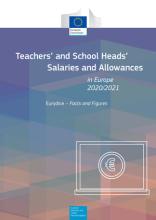The Organisation of School Time in Europe Primary and General Secondary Education 2020/21
How is the school year organised across Europe? The Eurydice report on the organisation of school time replies to this specific question. It contains national data on the length of the school year, the start and the end dates of each school year, the timing and length of school holidays and the number of school days. Despite some differences, countries show many similarities regarding the structure of their school calendars. Did you know that the countries where the school year begins the earliest are Denmark and Finland? With regard to the number of school days, it varies between 165 days in Albania and 200 days in Denmark and Italy.
In general, the number of school days is the same in primary and secondary education, but there are a few exceptions: in France and Albania (both in upper secondary education), Greece (in secondary education, teaching days and exam days are included), Romania and Serbia for example, the number of schools days is higher in secondary education than in primary.
Those key points and many others are illustrated by comparative figures. The information is available for 38 countries covering both primary and general secondary education and participating in the EU's Erasmus+ programme (27 Member States, the United Kingdom, Albania, Bosnia and Herzegovina, Switzerland, Iceland, Liechtenstein, Montenegro, North Macedonia, Norway, Serbia and Turkey).





